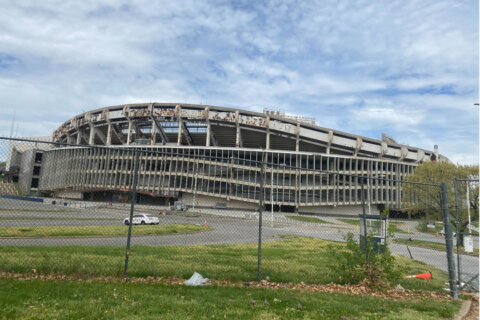A new Washington Commanders stadium would bring thousands of jobs and billions of dollars in revenue to D.C., according to a report commissioned by Mayor Muriel Bowser and released publicly Thursday.
The 71-page report estimates that a 65,000-seat NFL stadium in the city would lead to $1.26 billion in annual economic revenue and nearly 2,100 jobs. About 15,600 jobs would be created from construction of the stadium complex alone, according to Nina Albert, the city’s deputy mayor for planning and economic development.
Bowser commissioned the report to analyze the fiscal, economic and community impacts of professional sports in the city. But the D.C. report also projects a major boost to the local economy, if the Commanders move back to the city.
While D.C. is displaying the potential value of the franchise moving to the city, Maryland is fighting to keep the team there. Virginia is hoping to lure the team south after plans to bring the Wizards and Capitals to the Potomac Yard neighborhood of Alexandria fell through.
“(The) RFK stadium site is the logical place for an NFL stadium to locate,” Albert told WTOP. “With an additional 3 million square feet, potentially, of mixed-use development around it, that would unlock another major waterfront property and deliver the promise of the Anacostia Waterfront Revitalization.”
The House has passed the D.C. Robert F. Kennedy Memorial Stadium Campus Revitalization Act, which would allow D.C. to redevelop the old RFK site. Now, it’s pending Senate approval. The city’s focus, Albert said, is on getting the land transferred from the National Park Service.
“We continue to have conversations with the Commanders just to keep track of what’s going on with the legislation,” Albert said. “They’re going through their own process, and we’re just making sure that we’ve got a seat at the table.”
A Commanders spokeswoman declined to comment on the D.C. report.
The report projects an NFL stadium would cost $2 billion to construct. The estimates also consider a 3.1-million-square-foot mixed-use development that could include restaurants and bars, hotels and other entertainment or retail venues.
In a news release, the city described having an NFL franchise as a “once in a generation place-making opportunity.” The report doesn’t specifically say how a new stadium and entertainment complex would be paid for.
Albert, the deputy mayor, said the city hasn’t considered designs for the old RFK site, but “if we were so lucky to have the property transferred to the District, we would work with a private developer to really figure out what that development program looks like.”
The RFK site is close to a Metro station that’s designed for large crowds and major roads, Albert said, and a potential stadium there could also host concerts.
“That is the next great neighborhood along the waterfront,” Albert said.
Broadly, the city report said major sports generated $5 billion in 2022.
D.C.’s other sports franchises, the report found, are promoting growth in the neighborhoods where they’re located. For one, the city report said commercial real estate near sports complexes has outpaced other developments in the years after they open. Rents in Navy Yard and Gallery Place, where Nationals Park and Capital One Arena are located, are well above the city average, the report said.
The city report touts the advantage of sports facilities that “anchor” neighborhoods in urban areas, with a focus on pedestrians, shops and restaurants. Those contrast with “island” facilities, which the report describes as those with big parking lots that stand alone and don’t have a lot of economic development or pedestrian activity.
In the case of Nationals Park, the report found almost 25% of visitors went to a retail shop or restaurant before a game. That’s also true for 21% of Capital One Arena visitors, the city report found.
“Having a defined anchor is an accelerator of development, and the reason that is, is because now developers or property owners around that anchor can start to estimate who that anchor is going to attract,” Albert said.
The report uses other major hubs around U.S. sports franchises — such as The Battery Atlanta near Truist Park in Georgia and Hollywood Park near SoFi Stadium in California — to detail the possible economic value of such sports complexes.
The firms Jones Lang LaSalle Americas Inc. and the Robert Bobb Group put together the report.
Get breaking news and daily headlines delivered to your email inbox by signing up here.
© 2024 WTOP. All Rights Reserved. This website is not intended for users located within the European Economic Area.








